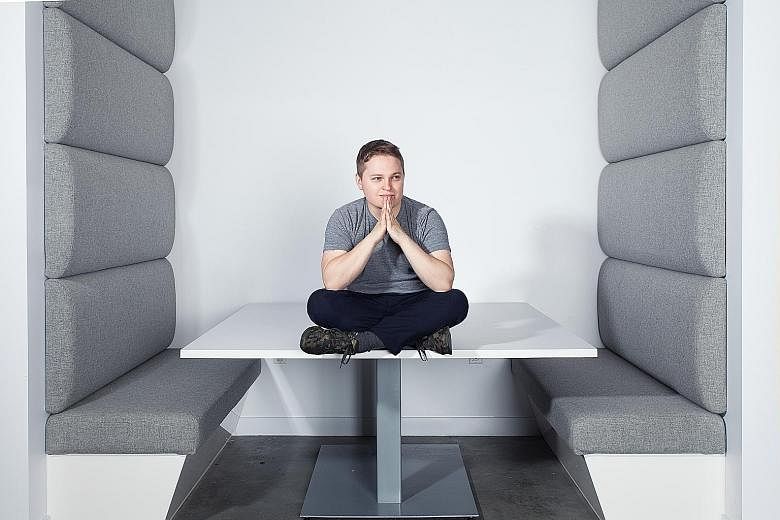NEW YORK • If you are reading this at 3am, chances are that Mr James Proud wants to put you in a deep slumber.
As the inventor of the sleep-tracking device Sense, he has enjoyed heady success in the quickly growing sleep tech field: Sense's 2014 Kickstarter campaign raised about US$2.4 million (S$3.5 million) even though the goal was only US$100,000.
One of his business partners is Ms Arianna Huffington, who stepped away from her media empire to be the queen of lifestyle wellness.
"I'm fascinated by helping people live better," said Mr Proud, 25, a British citizen who came to the United States via the Thiel Fellowship, which gives entrepreneurs US$100,000 for skipping college. "And sleep is the foundation of everything. So it's the best place to start."
Insomnia and other temporary and recurring sleep disorders affect 50 million to 70 million Americans, according to the National Institutes of Health and the effects only worsen as people grow older. Technology, while still nascent, is an alternative for those who do not want to take sleeping pills, which can be highly addictive.
Sense is the first product offered by Mr Proud's 50-employee company, Hello, based in San Francisco. It is sold on Amazon and will soon appear in Target and Best Buy stores.
To finance Sense, Mr Proud has raised more than US$40 million from backers such as Allen & Co. and Singapore's Temasek Holdings.
Like many other tech devices that monitor every twitch and turn of the human body, Sense uses sensors to collect data.
The information is then uploaded to a smartphone app that analyses sleep cycles. An accelerometer about the size of a quarter attaches to a pillow and tracks tosses and turns. A bedside hub, shaped like a ball, tracks sounds, light and temperature in a room. It glows green when sleep conditions are optimal.
"You can fall into bed drunk and it still works," said Mr Proud, a self- taught programmer.
Sleep technology products range from the basic app to the esoteric. The Sleep Shepherd headband, invented by a professor whose daughter had a sleep disorder, monitors brain waves while the wearer sleeps. Noise-cancelling headphones pipe in sound. Other devices also emit light, some mimicking sunsets.
They join hundreds of downloadable apps, such as Sleep Cycle and SleepBot, which track every sleep tic.
All are trying to solve an age-old problem with new technologies that experts say are still mostly unproven.
"Most of these apps and wearables don't have good-quality research that shows they improve sleep," said Dr Neil Kline, a sleep specialist. "It takes years to do good research. And a lot of these techno- logies just came out."
Yet, experts agree that the market is huge. About half of the US population will have insomnia on any given night, Dr Kline said.
After sleepless nights, entrepreneur Matteo Franceschetti decided in 2014 to start his sleep tech company, Eight, named after the optimal hours of sleep for humans.
The Italy-born lawyer attacked sleep from a different angle: by making mattresses smart.
The company invented a system that tracks time awake, breathing rate and number of tosses and turns through a mattress cover with sensors. An app then "grades" users' sleep, allowing them to adjust their sleeping habits.
Eight has raised US$6.5 million so far.
Some who study sleep say sensors do not necessarily solve the underlying problems of insomnia.
However, recent research does show that online cognitive behaviour therapies can help restore sleep.
After Mr Peter Hames developed insomnia, his doctor in England prescribed sleeping pills.
"Drugs have had a monopoly on evidence-based healthcare," he said.
Instead, he turned to a course in cognitive behaviour therapy deve- loped by an expert, which cured him in six weeks.
So he and others founded the digital health start-up Big Health and created Sleepio, an online sleep improvement programme that uses a virtual therapist. Cognitive behaviour therapy was shown to have good results in peer-reviewed trials in Britain.
"We synthesise the world's best experts," Mr Hames said. "Other apps have been toys, not true medicine."
NYTIMES

